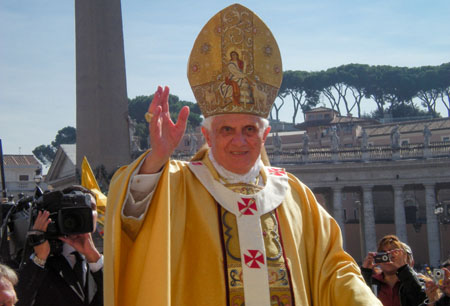by WorldTribune Staff, April 12, 2019
The Catholic Church’s abuse crisis was fueled by the sexual revolution of the 1960s, former Pope Benedict XVI has written.
Benedict, who resigned the papacy in 2013, says in a newly-drafted 6,000-word document – titled “The Church and the Scandal of Sexual Abuse” – that many in the ’60s fought for “all-out sexual freedom, one which no longer conceded any norms.”

“Part of the physiognomy of the Revolution of 1968 was that pedophilia was now also diagnosed as allowed and appropriate,” Benedict wrote.
In the document’s preface, Benedict said he consulted Pope Francis before moving to make the document public.
Benedict in the document, which was written in his native German for publication in a monthly periodical in his home region of Bavaria, largely blames the sex abuse crisis on clerics and theologians who, in the aftermath of Vatican II, abandoned natural law in the ’60s in favor of a more “pragmatic” morality.
“I have always wondered how young people in this situation could approach the priesthood and accept it, with all its ramifications,” Benedict wrote. “The extensive collapse of the next generation of priests in those years and the very high number of laicizations were consequence of all these processes.”
With the new morality, Benedict wrote, “there could no longer be anything that constituted an absolute good, any more than anything fundamentally evil; there could only be relative moral judgments.”
The result was that “in various seminaries, homosexual clubs were established, which more or less openly and significantly changed the climate in seminaries.”
Also encouraged was a “critical or negative attitude toward hitherto existing tradition” in favor of a “new, radically open relationship with the world,” Benedict wrote.
New York Post op-ed editor Sohrab Ahmari, who viewed the translated document, noted that Benedict points out that the looseness of the ’60s “also affected how the church handled cases of abusive priests, who we now know targeted mostly boys and young men.”
In church proceedings, Benedict wrote, “the rights of the accused had to be guaranteed” above all else, “to an extent that factually excluded any conviction at all.”
Ahmari noted that “Such absolutism in defense of the accused was incorrectly seen as a ‘conciliar’ requirement – anything less was a betrayal of Vatican II. Hence the cover-ups and shuffling around of abusive priests.
Benedict recommends reforming church law to give as much emphasis to protecting the faithful, not least the faith of ordinary Catholics, as to safeguarding the procedural rights of accused priests.
“Why did pedophilia reach such proportions?” Benedict asks. “Ultimately, the reason is the absence of God.”
Benedict says the document is ultimately meant to assist the Church in seeking “a new beginning” and making it “again truly credible as a light among peoples and as a force in service against the powers of destruction.”
Your Intel Brief: Geostrategy-Direct __________ Fix The Media Now
